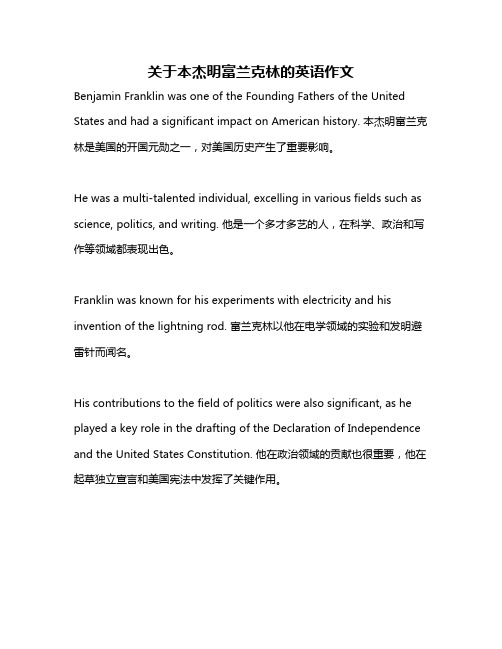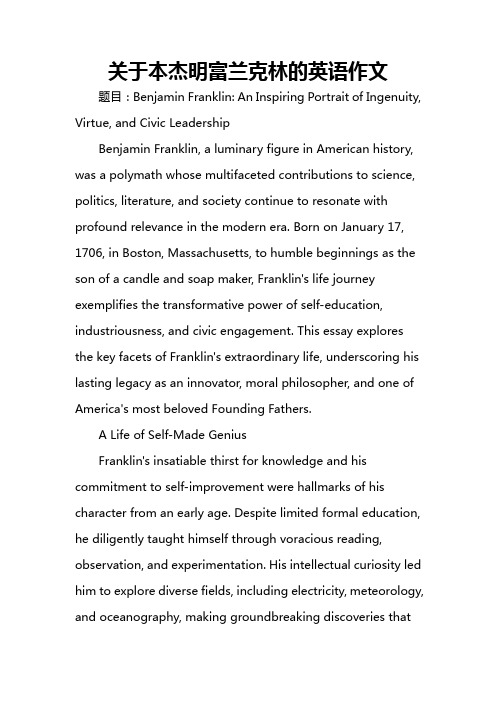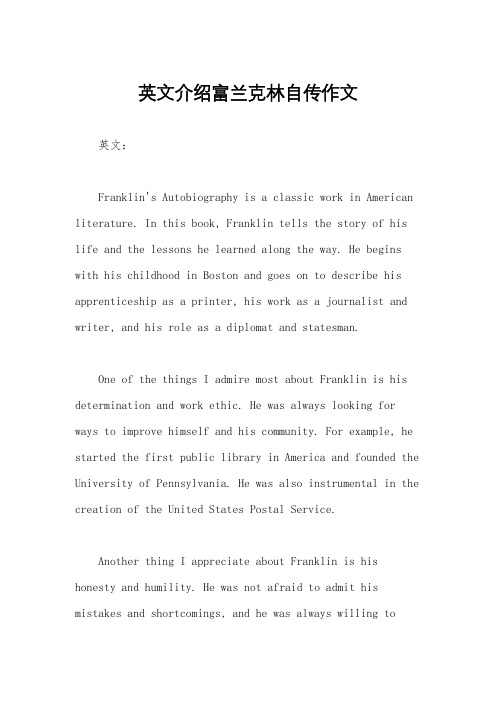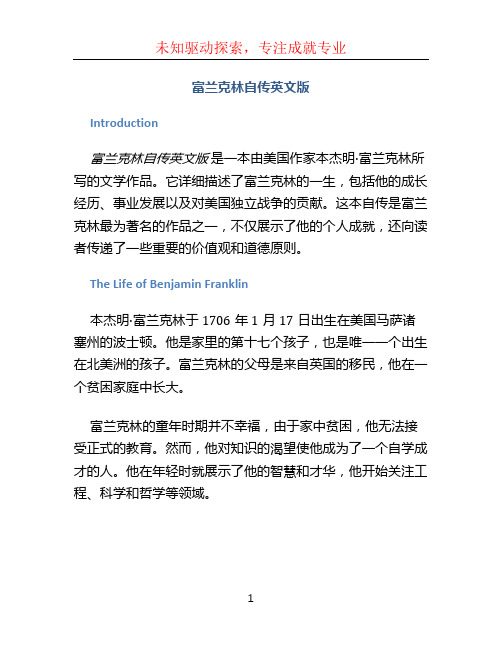(完整版)富兰克林英文介绍
关于本杰明富兰克林的英语作文

关于本杰明富兰克林的英语作文Benjamin Franklin was one of the Founding Fathers of the United States and had a significant impact on American history. 本杰明富兰克林是美国的开国元勋之一,对美国历史产生了重要影响。
He was a multi-talented individual, excelling in various fields such as science, politics, and writing. 他是一个多才多艺的人,在科学、政治和写作等领域都表现出色。
Franklin was known for his experiments with electricity and his invention of the lightning rod. 富兰克林以他在电学领域的实验和发明避雷针而闻名。
His contributions to the field of politics were also significant, as he played a key role in the drafting of the Declaration of Independence and the United States Constitution. 他在政治领域的贡献也很重要,他在起草独立宣言和美国宪法中发挥了关键作用。
In addition to his scientific and political achievements, Franklin was also a prolific writer, known for his wit and wisdom. 除了他在科学和政治领域的成就,富兰克林还是一个多产的作家,以他的机智和智慧而闻名。
One of his most famous works is "Poor Richard's Almanack," a collection of proverbs and practical advice that reflected his practical outlook on life. 他最著名的作品之一是《可怜理查年鉴》,这是一本反映他实用人生观的谚语和实用建议集。
英语听力文摘《本杰明·富兰克林》

英语听力文摘《本杰明·富兰克林》英语听力文摘《本杰明·富兰克林》本杰明·富兰克林是资本主义精神最完美的代表,十八世纪美国最伟大的科学家和发明家,著名的政治家、外交家、哲学家、文学家和航海家以及美国独立战争的伟大领袖;更是杰出的外交家及发明家。
下面,我们通过这篇英语听力文摘来了解一下这位伟大的人物吧。
Franklin's parents were both pious Puritans. The family attended the old South Church, the most liberal Puritan congregation in Boston, where Benjamin Franklin was baptized in 1706.富兰克林的双亲皆为虔诚的清教徒,他们加入了波士顿最自由的清教徒们所参加的古老的南方教堂,富兰克林也于1706年在那里受洗礼。
Franklin's father, a poor chandler, owned a copy of a book, Bonifacius: Essays to Do Good, by the Puritan preacher and family friend Cotton Mather, which Franklin often cited as a key influence on his life. The book preached the importance of forming voluntary associations to benefit society. Franklin learned about forming do-good associations from Cotton Mather, but his organizational skills made him the most influential force in making voluntarism an enduring part of the American ethos.他的父亲是位贫困的'杂货商,拥有一本Bonifacius的书,书名为:行善箴言,这本书是一个清教传教士也是富兰克林家族的朋友Cotton Mather写的。
关于本杰明富兰克林的英语作文

关于本杰明富兰克林的英语作文题目:Benjamin Franklin: An Inspiring Portrait of Ingenuity, Virtue, and Civic LeadershipBenjamin Franklin, a luminary figure in American history, was a polymath whose multifaceted contributions to science, politics, literature, and society continue to resonate with profound relevance in the modern era. Born on January 17, 1706, in Boston, Massachusetts, to humble beginnings as the son of a candle and soap maker, Franklin's life journey exemplifies the transformative power of self-education, industriousness, and civic engagement. This essay explores the key facets of Franklin's extraordinary life, underscoring his lasting legacy as an innovator, moral philosopher, and one of America's most beloved Founding Fathers.A Life of Self-Made GeniusFranklin's insatiable thirst for knowledge and his commitment to self-improvement were hallmarks of his character from an early age. Despite limited formal education, he diligently taught himself through voracious reading, observation, and experimentation. His intellectual curiosity led him to explore diverse fields, including electricity, meteorology, and oceanography, making groundbreaking discoveries thatreshaped scientific understanding. Most famously, his kite experiment in 1752 confirmed the connection between lightning and electricity, paving the way for the development of the lightning rod and earning him international acclaim.Beyond his scientific pursuits, Franklin was a prolific writer and publisher. He founded the _Pennsylvania Gazette_ and authored the iconic _Poor Richard's Almanack_, which not only provided practical information but also dispensed witty and enduring aphorisms on frugality, industry, and moral rectitude. These works, along with his later autobiography, serve as testament to his literary prowess and continue to inspire readers worldwide with their timeless wisdom.Virtuous Living and the Pursuit of Moral PerfectionFranklin's dedication to personal betterment extended beyond intellectual pursuits. He developed a system of 13 virtues, which he meticulously tracked and strove to embody in his daily life. These virtues—such as temperance, silence, order, resolution, and humility—reflected his belief in the transformative power of disciplined self-reflection and habit formation. His efforts to cultivate these qualities in himself became a model for self-improvement, demonstrating the possibility of refining character and fostering civic virtuethrough conscious effort.Public Servant and Diplomat ExtraordinaireFranklin's impact on American history extends far beyond his scientific and literary achievements. A steadfast advocate for colonial unity, he played a pivotal role in the movement towards independence from Great Britain. As a member of the Continental Congress, he helped draft the Declaration of Independence, and his diplomatic skills proved invaluable in securing French support during the Revolutionary War. His diplomatic tenure in France, marked by charm, wit, and strategic acumen, solidified his reputation as one of the nation's premier statesmen.Post-independence, Franklin contributed significantly to the drafting and ratification of the United States Constitution, serving as a delegate to the Constitutional Convention. His persuasive writing, particularly in the form of _The Federalist Papers_, helped garner public support for the new charter of government. His advocacy for a strong central government, balanced by checks and balances to protect individual liberties, remains a cornerstone of American constitutional thought.Legacy and InfluenceBenjamin Franklin's life and accomplishments stand as atestament to the power of individual initiative, lifelong learning, and civic engagement. His relentless pursuit of knowledge, commitment to self-improvement, and dedication to the common good have made him an enduring symbol of the American spirit. His writings, inventions, and diplomatic achievements continue to shape our understanding of science, ethics, and governance, while his practical wisdom and wit remain a source of inspiration for generations.In sum, Benjamin Franklin embodies the ideal of the Renaissance man, seamlessly blending intellectual curiosity, moral rectitude, and public service. His remarkable life serves as a beacon for all who aspire to make meaningful contributions to society, reminding us that greatness can arise from humble origins, and that through discipline, ingenuity, and a deep commitment to the betterment of humanity, one person can truly leave an indelible mark on history.。
英文介绍富兰克林自传作文

英文介绍富兰克林自传作文英文:Franklin's Autobiography is a classic work in American literature. In this book, Franklin tells the story of his life and the lessons he learned along the way. He begins with his childhood in Boston and goes on to describe his apprenticeship as a printer, his work as a journalist and writer, and his role as a diplomat and statesman.One of the things I admire most about Franklin is his determination and work ethic. He was always looking for ways to improve himself and his community. For example, he started the first public library in America and founded the University of Pennsylvania. He was also instrumental in the creation of the United States Postal Service.Another thing I appreciate about Franklin is his honesty and humility. He was not afraid to admit his mistakes and shortcomings, and he was always willing tolearn from others. This is evident in his famous quote, "I have not failed. I've just found 10,000 ways that won't work."Overall, Franklin's Autobiography is a fascinating and inspiring read. It is a testament to the power of hard work, perseverance, and self-improvement.中文:富兰克林的自传是美国文学中的经典之作。
(完整版)富兰克林英文介绍

Benjamin Franklin (January 17, 1706–April 17, 1790) was one of the Founding Fathers of the United States. A noted polymath, Franklin was a leading author and printer, political theorist, politician, postmaster, scientist, inventor, satirist, civic activist, statesman, and diplomat. As a scientist, he was a major figure in the American Enlightenment and the history of physics for his discoveries and theo-ries regarding electricity. He invented the lightning rod, bifocals, the Franklin stove, a carriage odometer, and the glass 'armonica'. He formed both the first public lending library in America and the first fire department in Pennsylvania. Franklin earned the title of "The First American" for his early and indefatigable campaigning for colonial unity; as an author and spokesman in London for sev-eral colonies, then as the first United States Ambassador to France, he exempli-fied the emerging American nation. Franklin was foundational in defining the American ethos as a marriage of the practical and democratic values of thrift, hard work, education, community spirit, self-governing institutions, and opposi-tion to authoritarianism both political and religious, with the scientific and toler-ant values of the Enlightenment. In the words of historian Henry Steele Com-mager, "In a Franklin could be merged the virtues of Puritanism without its de-fects, the illumination of the Enlightenment without its heat."To Walter Isaacson, this makes Franklin "the most accomplished American of his age and the most in-fluential in inventing the type of society America would become."Franklin, always proud of his working class roots, became a successful newspa-per editor and printer in Philadelphia, the leading city in the colonies. He was also partners with William Goddard and Joseph Galloway the three of whom published the Pennsylvania Chronicle, a newspaper that was known for its revo-lutionary sentiments and criticisms of the British monarchy in the American col-onies.He became wealthy publishing Poor Richard's Almanack and The Pennsyl-vania Gazette. Franklin gained international renown as a scientist for his famous experiments in electricity and for his many inventions, especially the lightning rod. He played a major role in establishing the University of Pennsylvania and was elected the first president of the American Philosophical Society. Franklin became a national hero in America when he spearheaded the effort to have Par-liament repeal the unpopular Stamp Act. An accomplished diplomat, he was widely admired among the French as American minister to Paris and was a ma-jor figure in the development of positive Franco-American relations. For many years he was the British postmaster for the colonies, which enabled him to set up the first national communications network. He was active in community affairs, colonial and state politics, as well as national and international affairs. From 1785 to 1788, he served as governor of Pennsylvania. Toward the end of his life, he freed his slaves and became one of the most prominent abolitionists.His colorful life and legacy of scientific and political achievement, and status as one of America's most influential Founding Fathers, have seen Franklin honored on coinage and money; warships; the names of many towns, counties, educa-tional institutions, namesakes, and companies; and more than two centuries af-ter his death, countless cultural references.Book reportFranklin was not in favorable growth environment, and it should be a relatively plain appearance. In 1706 he was in North America, the home of 17 children. His father is involved in wax and soap as a small businessman, Franklin entered the school for about two years before dropping out of school because of family dis-tress. Then he went to work as an apprentice in his brother’s shop, the apprentice days was very difficult, but he did a good use of the apprenticeship leisure time to study hard, and read a lot of books in politics, science, history and literature. He was also proficient in the use of French, Italian, Spanish and Latin.In 1726 Franklin manages a printing factory, it was a great success which created a legend of the American dream, and he printed a huge impact “Pennsylvania”. He invented the lightning rod, dual-purpose glasses, new stove and new lights. He pi-oneered the North American colonies the slogan that is “not join the death”and drafted out the drafting of “Declaration of Independence”published in 1771 which changed the fate of countless people, and this book gave a description of its pro-cess of growth and exhorted the people to be positive.(换ppt)There are a lot of Proverbs in this book that Franklin felt in his life, reading this book is not only to feel the sentiment, but also to combine their training and hu-manity and then to improve ourselves, the book describes each chapter are a true portrayal of his life and tell us how to get all the perception which inspired me very much.In his view, reading is the key to success. Books give us wisdom, strengthen our determination and let us have the wisdom of the trip of our life.Franklin attaches great importance to his virtue. Therefore, he proposed to 13 re-quirements for himself namely: control, quiet, orderly life, determination, frugal-ity, diligence, sincerity, justice, moderation, cleanliness, tranquility, chastity and humility. He has been trying to do that, though he cannot completely meet all the requirements, but he was persistent. The people who can meet the 13 require-ments can be called “saints”of the fact that people are rarely perfect, but it can pursue such a perfect people in the United States and Germany who have achieved great success.Franklin was revered as the father of America for his impressive image that can maintain a frugal life style of work for the public welfare and make immortal con-tributions, compared to the majority of people we can knew how impetuous we are.(huan)In this clear, crisply written story of his life, Benjamin Franklin shows the reader what his childhood was like and what he came to value as meaningful and worth-while techniques of communication, conduct, and self-improvement. A conscien-tious and serious youth, Franklin nevertheless left his boyhood town because he had impregnated a young lady. This early act of responsibility led him to pursue work that led him, in the coming years of the American Revolution, to be a strong advocate of political independence, even at the cost of war. Franklin became as fine a statesman as ever the United States was to produce. One of the country's founding fathers and a tireless champion of individual liberty, he also served as the American ambassador to France. He tells of how he learned the printing trade and how he established "Poor Richard's Almanac." He also shares with hisreaders his hopes for the free country that he helped to bring into being. The reader cannot help but admire this brilliant and brave founding father, as much for his humility as for his services to his country and its future citizens. (huan)名言Silence is not always a sign of wisdom, but babbling is ever a folly.沉默并不是智慧的标志,但唠叨永远是一项蠢行。
Franklin D. Roosevelt-富兰克林英文简介

Childhood and education
Roosevelt in 1893, at the age of 11
• Roosevelt was born in Hyde Park, New York, to a Dutch American family made well known by Theodore Roosevelt, the 26th President of the United States. FDR attended Groton School, Harvard College, and Columbia Law School, and went on to practice law in New York City.
His main symptoms were fever; symmetric, ascending paralysis; facial paralysis; bowel and bladder dysfunction; numbness and hyperesthesia; and a descending pattern of recovery. Roosevelt was left permanently paralyzed from the waist down.
Franklin D. Roosevelt
• Franklin Delano Roosevelt was an American statesman and political leader who served as the 32nd president of the United States from 1933 until his death in 1945. He won a record four presidential elections and became a central figure in world events during the first half of the 20th century. Roosevelt directed the federal government during most of the Great Depression. As a dominant leader of his party, he built the New Deal Coalition, and his third and fourth terms were dominated by the Second World War . He is often rated by scholars as one of the three greatest U.S. presidents .
富兰克林自传英文版

富兰克林自传英文版Introduction富兰克林自传英文版是一本由美国作家本杰明·富兰克林所写的文学作品。
它详细描述了富兰克林的一生,包括他的成长经历、事业发展以及对美国独立战争的贡献。
这本自传是富兰克林最为著名的作品之一,不仅展示了他的个人成就,还向读者传递了一些重要的价值观和道德原则。
The Life of Benjamin Franklin本杰明·富兰克林于1706年1月17日出生在美国马萨诸塞州的波士顿。
他是家里的第十七个孩子,也是唯一一个出生在北美洲的孩子。
富兰克林的父母是来自英国的移民,他在一个贫困家庭中长大。
富兰克林的童年时期并不幸福,由于家中贫困,他无法接受正式的教育。
然而,他对知识的渴望使他成为了一个自学成才的人。
他在年轻时就展示了他的智慧和才华,他开始关注工程、科学和哲学等领域。
Journey to Success富兰克林的事业发展可以说是非常成功的。
他在年轻时成为了一名打字员,而后又进入报纸行业工作。
他不仅为报纸撰写文章,还创办了自己的报纸The Pennsylvania Gazette。
在媒体行业的成功之后,他开始尝试其他领域,包括打字机的发明以及电学的研究。
富兰克林的一生中,他还担任过许多重要职位。
他是美国宪法的主要起草人之一,也是美国第一份宪法The Articles of Confederation的签署者。
此外,他还被任命为美国驻法国大使,为美国争取到了重要的外交支持。
Impact on American Independence富兰克林对美国独立战争的贡献非常重要。
作为一名政治家和外交家,他努力为美国争取到法国的支持。
他在法国期间发表了许多演讲和文章,呼吁法国人支持美国的独立事业。
他的努力最终确保了法国的介入,为美国赢得了战争的胜利。
在富兰克林的政治生涯中,他还提出了许多重要的政治理念和原则。
他强调了公共服务和自我教育的重要性,提倡民主和自由的价值观,对美国独立的理念产生了深远的影响。
English Report--Benjamin Franklin(英语报告--富兰克林)

Question:
What do you learn from Benjamin Franklin?
Example
I think Frankin was such a warmhearded man that he helped the society a lot and was interested in charity.because of his unselfish,he can be a great politician
He is…
A musician A writer A bookman
A politician A scientist An inventor
and
The leader of Independence War
Childhood
• On 17th January 1706 Benjamin Franklin was born in Boston His father is a lacquerer(漆匠), and had 17 children, so this family was quite poor Fraklin’s shool life only lasted two years.then he became a print worker.but he never stoped studing.he saved up for books.he usually read all night.
A scientist
Franklin was a famous scientist.He was interested in electricity,and had great achievement.his most famous experiment is the Kite Experiment
- 1、下载文档前请自行甄别文档内容的完整性,平台不提供额外的编辑、内容补充、找答案等附加服务。
- 2、"仅部分预览"的文档,不可在线预览部分如存在完整性等问题,可反馈申请退款(可完整预览的文档不适用该条件!)。
- 3、如文档侵犯您的权益,请联系客服反馈,我们会尽快为您处理(人工客服工作时间:9:00-18:30)。
Benjamin Franklin (January 17, 1706–April 17, 1790) was one of the Founding Fathers of the United States. A noted polymath, Franklin was a leading author and printer, political theorist, politician, postmaster, scientist, inventor, satirist, civic activist, statesman, and diplomat. As a scientist, he was a major figure in the American Enlightenment and the history of physics for his discoveries and theo-ries regarding electricity. He invented the lightning rod, bifocals, the Franklin stove, a carriage odometer, and the glass 'armonica'. He formed both the first public lending library in America and the first fire department in Pennsylvania. Franklin earned the title of "The First American" for his early and indefatigable campaigning for colonial unity; as an author and spokesman in London for sev-eral colonies, then as the first United States Ambassador to France, he exempli-fied the emerging American nation. Franklin was foundational in defining the American ethos as a marriage of the practical and democratic values of thrift, hard work, education, community spirit, self-governing institutions, and opposi-tion to authoritarianism both political and religious, with the scientific and toler-ant values of the Enlightenment. In the words of historian Henry Steele Com-mager, "In a Franklin could be merged the virtues of Puritanism without its de-fects, the illumination of the Enlightenment without its heat."To Walter Isaacson, this makes Franklin "the most accomplished American of his age and the most in-fluential in inventing the type of society America would become."Franklin, always proud of his working class roots, became a successful newspa-per editor and printer in Philadelphia, the leading city in the colonies. He was also partners with William Goddard and Joseph Galloway the three of whom published the Pennsylvania Chronicle, a newspaper that was known for its revo-lutionary sentiments and criticisms of the British monarchy in the American col-onies.He became wealthy publishing Poor Richard's Almanack and The Pennsyl-vania Gazette. Franklin gained international renown as a scientist for his famous experiments in electricity and for his many inventions, especially the lightning rod. He played a major role in establishing the University of Pennsylvania and was elected the first president of the American Philosophical Society. Franklin became a national hero in America when he spearheaded the effort to have Par-liament repeal the unpopular Stamp Act. An accomplished diplomat, he was widely admired among the French as American minister to Paris and was a ma-jor figure in the development of positive Franco-American relations. For many years he was the British postmaster for the colonies, which enabled him to set up the first national communications network. He was active in community affairs, colonial and state politics, as well as national and international affairs. From 1785 to 1788, he served as governor of Pennsylvania. Toward the end of his life, he freed his slaves and became one of the most prominent abolitionists.His colorful life and legacy of scientific and political achievement, and status as one of America's most influential Founding Fathers, have seen Franklin honored on coinage and money; warships; the names of many towns, counties, educa-tional institutions, namesakes, and companies; and more than two centuries af-ter his death, countless cultural references.Book reportFranklin was not in favorable growth environment, and it should be a relatively plain appearance. In 1706 he was in North America, the home of 17 children. His father is involved in wax and soap as a small businessman, Franklin entered the school for about two years before dropping out of school because of family dis-tress. Then he went to work as an apprentice in his brother’s shop, the apprentice days was very difficult, but he did a good use of the apprenticeship leisure time to study hard, and read a lot of books in politics, science, history and literature. He was also proficient in the use of French, Italian, Spanish and Latin.In 1726 Franklin manages a printing factory, it was a great success which created a legend of the American dream, and he printed a huge impact “Pennsylvania”. He invented the lightning rod, dual-purpose glasses, new stove and new lights. He pi-oneered the North American colonies the slogan that is “not join the death”and drafted out the drafting of “Declaration of Independence”published in 1771 which changed the fate of countless people, and this book gave a description of its pro-cess of growth and exhorted the people to be positive.(换ppt)There are a lot of Proverbs in this book that Franklin felt in his life, reading this book is not only to feel the sentiment, but also to combine their training and hu-manity and then to improve ourselves, the book describes each chapter are a true portrayal of his life and tell us how to get all the perception which inspired me very much.In his view, reading is the key to success. Books give us wisdom, strengthen our determination and let us have the wisdom of the trip of our life.Franklin attaches great importance to his virtue. Therefore, he proposed to 13 re-quirements for himself namely: control, quiet, orderly life, determination, frugal-ity, diligence, sincerity, justice, moderation, cleanliness, tranquility, chastity and humility. He has been trying to do that, though he cannot completely meet all the requirements, but he was persistent. The people who can meet the 13 require-ments can be called “saints”of the fact that people are rarely perfect, but it can pursue such a perfect people in the United States and Germany who have achieved great success.Franklin was revered as the father of America for his impressive image that can maintain a frugal life style of work for the public welfare and make immortal con-tributions, compared to the majority of people we can knew how impetuous we are.(huan)In this clear, crisply written story of his life, Benjamin Franklin shows the reader what his childhood was like and what he came to value as meaningful and worth-while techniques of communication, conduct, and self-improvement. A conscien-tious and serious youth, Franklin nevertheless left his boyhood town because he had impregnated a young lady. This early act of responsibility led him to pursue work that led him, in the coming years of the American Revolution, to be a strong advocate of political independence, even at the cost of war. Franklin became as fine a statesman as ever the United States was to produce. One of the country's founding fathers and a tireless champion of individual liberty, he also served as the American ambassador to France. He tells of how he learned the printing trade and how he established "Poor Richard's Almanac." He also shares with hisreaders his hopes for the free country that he helped to bring into being. The reader cannot help but admire this brilliant and brave founding father, as much for his humility as for his services to his country and its future citizens. (huan)名言Silence is not always a sign of wisdom, but babbling is ever a folly.沉默并不是智慧的标志,但唠叨永远是一项蠢行。
